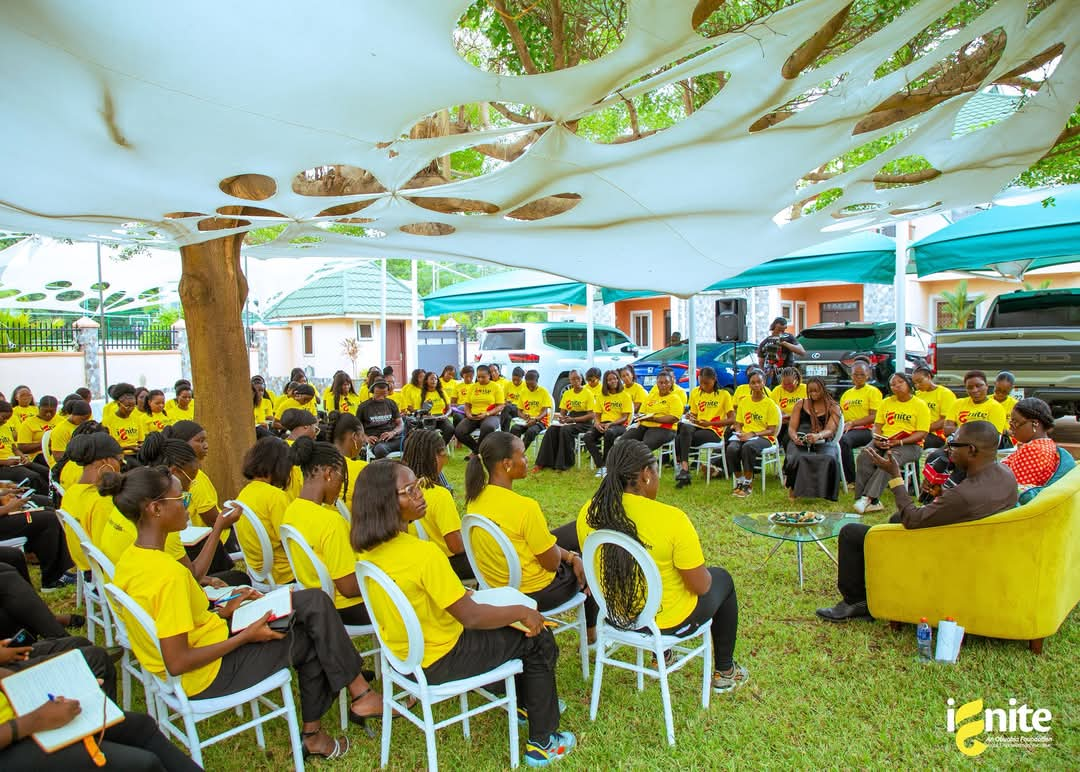As Zuwera Alhassan walks briskly crashing the grass on her way to the village borehole, she realized a sudden feeling of wetness, alerting her that it was that time of the month again.
She soon started thinking of the consequences that surround the ‘period’ time when in school; the fear of staining her uniform and the teasing by her classmates, especially the boys.
This is the usual once a month strikes she goes through.
Meanwhile in the sun baked savannah areas and rural communities of Northern Ghana, some quiet crisis continue to creep in lives of adolescent young girls that are keeping them out of school.
Their inability to go to school or keep in school is not because of lack of ambition, family support nor family stereotyping, but an intimate and stigmatized old issue: the inability to afford sanitary pads and keeping to regular routine supplies of the pads.
For many of the girls growing up in these Regions especially the remotest part of the villages of the Upper East and Upper West regions as well as Northern Region, menstruation is not just a physical change but becomes a recurring reason for shame, for anxiety, and for missed school days. While menstruation is a natural biological process, for the girls living in poverty, it is often a monthly silent crisis that quietly disrupts girls’ education, self-esteem, and mental well-being.
In many parts of the world, the monthly cycle that marks the beginning of womanhood becomes a source of anxiety and missed opportunities for young adolescent girls. At the heart of this issues lies resource poverty-the lack of access to affordable and hygienic menstrual hygiene products.
The silent struggles
For millions of girls, sanitary pads are a luxury irrespective of brand name of the product-a basic necessity.
In resource poor communities, families that are struggling to afford food and shelter often cannot justify spending money on menstrual products.
As a result, girls resort to using unsafe alternatives such as rags, leaves, or even old socks improvised as pads, which materials can lead to infections, discomfort, and a constant fear of leakage.
“I used to stay home for days,” says 14-year-old Mary Ayaan, a student in a rural village. “I was too afraid to go to school because I didn’t have pads. I felt dirty, embarrassed, and alone.”
Mary’s story is echoed by millions of adolescent girls across the globe. Meanwhile, a UNESCO report estimates that one in 10 girls in Sub-Saharan Africa misses school solely during their period.
Some eventually drop out all together with evidence showing lack of menstrual hygiene management as significant barrier, poor sanitation and inability to afford sanitary products.
“I don’t get the sanitary pad regularly, sometimes I use old cloth to manage my period and at times when I don’t have any readily available, I have to remain indoors because I cannot engage in any active work or exercise that will expose me,” says Portia, 16 years, from a small community at Kpantarigu . “Sometimes it leaked, and boys laughed. I felt like hiding.”
According to local NGOs and education officials, girls in Northern Ghana miss an average of 4-5 days of school each month due to lack of access to menstrual products.
That adds up to as much as 20 per cent of the school year. Over time, these lost hours contribute to poor academic performance, lower self-esteem, and ultimately, higher dropout rates, particularly in Junior High School.
Poverty plays crucial role and in many households where daily meals are not guaranteed, it is impossible to spend GHC10–18 per month on sanitary pads. It is simply not feasible.
Instead, girls rely on improvised methods like old cloths, toilet tissue, or even dried leaves, which cannot guarantee safety because they do not only lack absorption capacity, but discomfort and can lead to bruises, infections and eventually other health complications.
“In our schools, some girls come to us the teachers to solicit pads, but we don’t always have any to give,” says Madam Beatrice, a head teacher at an Islamic basic school near Sawaba in the Bolgatanga Municipality. “Sometimes they just stay at home.”
The impact of this Silent Crises goes beyond the classroom. The fear of staining, teasing by classmates and the taboo around discussing menstruation breed emotional distress and low confidence in girls.
The cultural silence
Cultural silence around menstruation adds another layer of difficulty. In many traditional homes, periods are viewed with shame or as a private issue not to be discussed, even among women. Girls and women in some families and communities are restrained from doing the meals because menstruation is considered dirty and therefore the turn of any woman or girl to cook the meals may have to stay away from the kitchen or get assisted by another person in the house when in their period.
Whilst the silence prevents girls from getting the information they need to manage the menstruation safely and with dignity, they also become withdrawn and less likely to participate in class or public events.
Gone were the days when girls and women in their periods were prevented from fetching water from certain rivers claiming the gods detested it and its implications were dire.
“Periods are never discussed at home,” says 13-year-old Abiba from the Tolon District. “If I talk about it, my brothers’ laugh and my mother just tell me to keep clean. But how can I be clean without pads?”
Emotional toll
Feelings of shame, embarrassment, and low self-worth are common. Girls internalize the message that their bodies are something to be hidden – something that makes them “less than.” This emotional strain, coupled with the stress of falling behind in school, lead to anxiety, depression, and a lack of confidence.
“I am always worried people would find out if I was on my period,” says Regina, 13, “So I hide my pad even when I had them, I didn’t feel safe. I didn’t want anyone to look at me.”
This chronic anxiety is more than just a mental burden and it directly affects concentration, participation in class, and overall academic performance.
“When I soil my dress with blood stains, I have to use a pull over or a shirt from my friends to cover my stains”, says Zuwera.
Interrupted education
The educational impact of period poverty is profound. Girls often miss up to a week of school every month due to a lack of sanitary products and inadequate sanitation facilities. Over time, these absences accumulate, creating learning gaps that are difficult to bridge.
Moreover, schools without private, functional toilets and clean water supply further discourage attendance during menstruation. Girls report feeling anxious and humiliated when they stain their clothes or are teased by peers, a reality that reinforces the stigma and deepens their isolation.
Government’s free sanitary pads
Ghana’s President, Mr John Dramani Mahama in a bid to address this period poverty launched the Free Sanitary pad policy to provide two million girls in public basic and senior secondary schools with sanitary pads every month to reduce school absenteeism caused by menstruation, improve hygiene and girls dignity.
A remarkable intervention by government even though some NGOs kick started the process of easing the burden on families through similar initiatives like pad distribution drives, menstrual health education, and the building of girl-friendly toilets to make a difference, the demand far outweighs the resources.
The government’s Free sanitary pad policy has opened doors for many girls, but until some of the challenges of these girls are addressed; constant supply of the pads, increased hygiene education, teasing of the girls be curtailed, changing rooms for girls else this quiet crisis will continue to crib into the lives of adolescent young girls thereby keeping them out of school all the time they find themselves in such situations.
Speaking with some basic school girls on the free pad distribution, Inocencia, a basic six pupil in one of the Catholic schools in Walewale in the North East Region said she had not received any of the pads. Her dream is possible, but only if Ghana, starting with its northern regions, can make the commitment to support every girl, every month.
“Access to pads is not a luxury, it’s a right,” says Hajia Fati, a community health nurse working in the North East Region. “When girls are empowered to manage their periods, they stay in school and they dream bigger”. She added.
The Ghana Education Service has so far distributed 6.6 sanitary nationwide to school girls in the 16 regions as part of the 2025 International Girl Child Day celebrated globally on the theme: “The girl I am , the change I lead; girls on the frontlines of the crises.”
Back in her classroom, Salamatu now receives free pads through a local programme funded by an international NGO. She hasn’t missed school in two months. “I feel happy and free,” she says quietly. “I want to become a nurse and help other girls like me.”
To confront the challenges faced by these girls, the silence crisis need to be broken, period poverty and educational crisis must be tackled in a holistic way that is sanitary pads must be treated not as optional items but as essentials, just like exercise books or school uniforms.
Schools need better sanitation, and communities must be encouraged to break the silence and support girls through this natural stage of life.
Breaking the cycle
Solutions exist, but they require coordinated action. Governments, NGOs, and communities must prioritize menstrual health as a key component of public health and education policy.
Initiatives such as free distribution of sanitary pads in schools, menstrual health education, and the improvement of school sanitation infrastructure can make a significant difference.
Additionally, tackling the cultural stigma around menstruation is crucial. Open conversations in schools, families, and communities, can help dismantle the shame that so often surrounds periods.
Empowering girls with the tools and knowledge to manage their menstruation with dignity is not just about hygiene. It’s about equality, access, and ensuring that no girl is forced to choose between her education and her biology.
A call to action
The silent struggle of the girls are solvable problems, which requires government to recognize menstrual health as a fundamental human right. When girls are given the resources and support they need, they don’t just stay in school, they thrive.
Mary now receives free pads through a school-based programme. “Now I don’t miss school. I feel clean, I feel proud,” she says with a smile.
Her story is proof that small interventions can create lasting change; one pad, one girl, one school at a time.
GNA

















